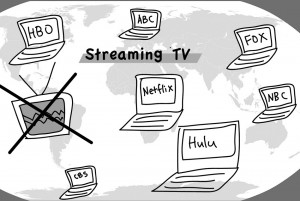New streaming business model paves way | Daily Trojan

Amy Hsieh | Daily Trojan
When kids in the modern day want to kick back with their favorite television show after a long, hard day?s work, very few turn on their actual television sets.
With the advent of Netflix, Hulu, HBO Go and dozens of other streaming sites, as well as the handy DVR and TiVo recording devices, the idea of sitting through commercials at a specific time each night to watch your favorite show is an outdated concept. It appears that modern adults no longer have the patience nor the flexibility to consume traditional primetime television, and the shift can be felt in the community in more ways than one.
Last week, a divided federal appeals court decided in a 2-1 ruling to decline blocking a subscription service that enables the streaming of broadcast television to any Internet-enabled device, a move establishing that the streaming of television, videos and other media is a trend that is here to stay.
Some companies, such as Netflix and Hulu, have already adapted to this shift in the television landscape, and other companies should follow suit if they want to compete.
In February, Netflix released its original series House of Cards, a decision that allows the company to avoid expensive licensing fees and become more popular.
?Netflix ? long known for its movie offerings ? is now trying to change the way you watch television,? says journalist Willa Paskin from WBUR.
House of Cards, starring Kevin Spacey, has become wildly popular, and Netflix plans to develop another sci-fi television show in the months to come. In addition, Netflix will exclusively release the upcoming season of Arrested Development to eagerly waiting fans this summer. For Netflix, the results have exceeded all expectations.
?Even though its availability is restricted to Netflix users, the series has experienced huge success, marking what will take off as a trend in television if marketers have any shred of sense,? said Laura Scherb in The Tartan.
The move allows viewers to consume the show in whichever manner that they want by offering all the episodes in a television season at once, instead of distributing them weekly, as traditional programming does. This move, while intensely scrutinized by experts in the television industry, is in reality a tactical success. Netflix can build their brand as a company catering to the needs of their consumers, and that alone will set off a trend.
In fact, the success of the ?Netflix model? has already prompted competitors, such as Amazon and Microsoft, to begin preparing for their own investments in original programming.
?Netflix executives believed, all along, that their loyal customer base was the company?s ace in the hole,? wrote John Friedman of the Fiscal Times. ?Its core of most enthusiastic subscribers, who love Netflix?s streaming and DVD-rental offerings, believe the company has made people?s lives easier and deserves a lot of credit for coming up with a better way for people to enjoy movies and television programs at home.?
This strategy of catering to the comfort and convenience of the consumer is an example of an ever-changing industry ? and it just might be the future of entertainment.
?It?s predicted that over 50 percent of U.S. Internet users will be watching television online by 2014,? said columnist Shawn Amos in the Huffington Post. ?Right now, 5 million people say they?ve ditched pay TV in favor of Internet streaming.?
Television companies would be wise to capitalize on this shift while they can because as with any changing industry, time is of the essence.
?Can pay TV dig its heels in and try to hold off the future?? Amos asked. ?Just ask someone in the record industry how that strategy worked out.?
The landscape of television is shifting, and as streaming content becomes more and more popular, it seems likely that the image of families sitting down together on certain nights each week to watch a show together will become a distant memory.
And if entertainment businesses refuse to accept this change, then they will certainly falter. It is time for the industry to embrace this transformation and figure out new ways to distribute or risk being seen as old and out-of-touch.
Companies such as Netflix have changed the focus of the industry from the stars and networks to the consumer ? and, for once, the audience is considered the priority.
Whether or not this speaks well for our generation or for the future has yet to be determined, but one thing is certain: If television companies want to keep up with the changes in technology and adapt to their consumer base, they will need to find new ways of giving consumers exactly what they want ? and when they want it.
?
Payal Mukerji is a junior majoring in business administration. Her column ?Risky Business? runs Tuesdays.
?
?
?
Source: http://dailytrojan.com/2013/04/08/new-streaming-business-model-paves-way/
amanda bynes arrested f 18 jet crash in virginia beach john tortorella nicki minaj beez in the trap video food network f/a 18

0টি মন্তব্য:
একটি মন্তব্য পোস্ট করুন
এতে সদস্যতা মন্তব্যগুলি পোস্ট করুন [Atom]
<< হোম